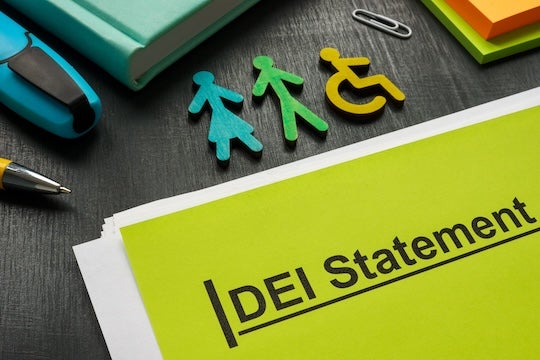According to new research from Rice University and the University of Nebraska at Omaha, conservative-leaning job applicants indicate being less likely to pursue positions that require personal statements on diversity, equity and inclusion (DEI), and those negative reactions are not independent of anti-Black racism.
The paper appears online in the Journal of Occupational and Organizational Psychology. The researchers, including Mikki Hebl, the Martha and Henry Malcolm Lovett Chair of Psychological Sciences at Rice, and lead author Abigail Folberg, an assistant professor of psychology from the University of Nebraska at Omaha, analyzed job applicant reactions to statements inquiring how they would support and contribute to DEI at an organization. Known as “diversity statements” or “DEI statements,” these are commonly used in higher education for faculty and staff positions and government jobs.
Across three studies of more than 1,100 Black and white job applicants, the researchers found that those who identified as more conservative perceived the organization as less fair, expected a worse fit with the organization and showed less job interest overall after they read a request for these statements versus when they read a request to provide a teamwork statement.
“These responses are consistent with conservative complaints that diversity statements were unrelated to job function, politicized and therefore inappropriate,” Hebl said.
In the second study, the researchers varied whether requests for DEI or teamwork statements were paired with a rationale (e.g., to create a more welcoming environment for employees). The researchers discovered that when study participants were given a reason for asking for DEI statements, their negative feelings about the practice did not change. Even when DEI statements were linked to job-related reasons, conservatives mostly still responded negatively to requests for them.

However, participants who were more conservative liked requests for personal statements that aligned with their conservative values, such as statements about family values.
“So it appears that participants didn’t have issues so much with the seemingly political nature of a personal statement — it was more they had an issue specifically with the DEI statement,” Folberg said.
Across all studies, participants completed a widely used measure of anti-Black racism in a separate session. Participants rated the extent to which they agreed with statements such as “Black leaders are trying to push people too fast,” and “Blacks are responsible for creating much of the racial tension that exists in the United States.” Strikingly, self-reported scores on anti-Black discrimination accounted for conservative participants’ negative reactions to DEI statements, suggesting that seemingly race-neutral conservative backlash to requests for DEI statements may reflect their true beliefs. Not surprisingly, Black individuals were more likely to evaluate requests for DEI statements more favorably than white individuals.
“We believe it’s important to continue asking job applicants to provide statements of DEI support, not only because this reflects who is supportive of diversity but also clearly identifies who is not,” Hebl said. “Furthermore, reporting from multiple news outlets indicates that there is a well-organized and well-funded conservative effort to do away with organizational diversity programming.”
“Although conservative objections to DEI initiatives are often framed as having little to do with race, our work

suggests that it may be motivated by anti-Black racism,” Folberg said. “Certainly, organizations have a duty to respond to employee and applicant complaints about organizational programming. However, they should also realize that they cannot do away with DEI policies just because some groups frame them as anti-white and discriminatory.”
The study was co-authored by Laura Brooks Dueland, Matthew Swanson, Sarah Stepanek and Carey Ryan from the University of Nebraska at Omaha.

